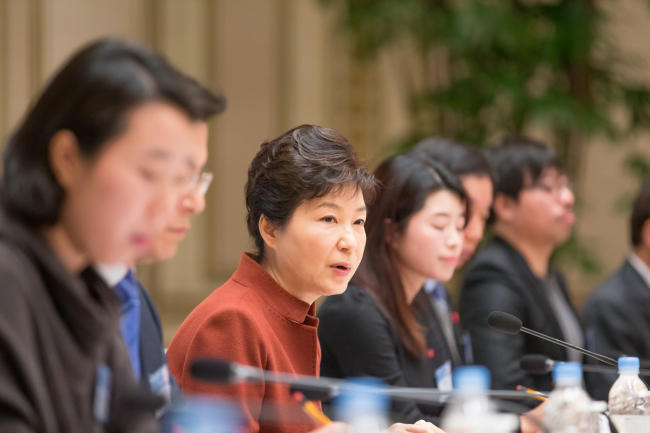Park connects low fertility to pending labor market reforms
By Korea HeraldPublished : Dec. 10, 2015 - 18:25
President Park Geun-hye on Thursday called for efforts to tackle South Korea’s low birthrate, which she said was linked to the inflexible labor market that underscores the need for labor reform measures that have been left pending at the National Assembly.
The low birthrate, according to the president, is due to the lack of jobs, and the consequential delay in marriage, and the fundamental solution is to reform the current labor structure.
“The government is currently pushing strongly ahead with labor reforms to revitalize the economy and solve youth unemployment,” she said during the meeting of a committee to solve issues relating low fertility and an aging society.
The low birthrate, according to the president, is due to the lack of jobs, and the consequential delay in marriage, and the fundamental solution is to reform the current labor structure.
“The government is currently pushing strongly ahead with labor reforms to revitalize the economy and solve youth unemployment,” she said during the meeting of a committee to solve issues relating low fertility and an aging society.

Her remarks were the latest in a series of pressure against the Assembly that wrapped up its last regular plenary session without endorsing the administration’s key economic bills.
On Tuesday during a Cabinet meeting, Park had said, “If the parliament speaks of job creation on one hand, but deters the labor reform bill legislation on the other, the people’s expectations will turn into disappointment and anger.
During Thursday’s meeting to endorse the government’s plan to provide some 135,000 homes for newlyweds in the next five years and create 370,000 new jobs for the youth, Park said, “The reason for late marriages is that young people cannot find themselves a decent job.”
“Having neither job stability nor a fixed income, they conceive marriage as something beyond their power.”
It was the second time since this February that Park chaired the fertility policy committee meeting. “If our country fails to solve this problem now, young people will forget to love and continue to live in a repetitive everyday grind,” Park said.
South Korea started to address the low birthrate issue in 2005 when its total fertility rate, which is the average number of children a healthy woman would bear in her lifetime, reached a record low of 1.08.
Spending some 80 trillion won ($68 billion) over the past 10 years, the nation saw the figure edge up to 1.205 last year, but still faces challenges in order to raise the number further to 2.1, the estimated replacement rate that would keep the population stable.
The first step solution, the president claimed, is to improve the country’s labor structure. “The government is pushing ahead with labor reform plans to create jobs for the young generation and to boost our economy, which requires cooperation and concessions from all people,” Park said.
“We must improve the labor market situation by extending the retirement age, rearranging the salary system and reducing working hours.”
The parliament, having failed to approve the pending labor reform bills Wednesday, is expected to continue negotiations during the extraordinary sessions this month. But the given discussion is likely to drag on as the ruling Saenuri Party and the main opposition New Politics Alliance for Democracy continue to lock horns over the parliamentary itinerary.
By Bae Hyun-jung (tellme@heraldcorp.com)
-
Articles by Korea Herald



















